- Home
- Ken Follett
The Modigliani Scandal Page 3
The Modigliani Scandal Read online
Page 3
Willow changed his mind about the cigar, and took one from the box in Lampeth's inlaid desk. ''Yes, that was my thinking. I've sounded him out about a show: he says he has enough new work to justify it.''
''Good. The New Room, perhaps?'' The gallery was too big for it all to be devoted to the work of a single living artist, so one-man exhibitions were held in smaller galleries or in part of the Regent Street premises.
''Ideal.''
Lampeth mused: ''I still wonder whether we wouldn't be doing him a favor by letting him go elsewhere.''
''Perhaps, but the outside world wouldn't see it like that.''
''You're quite right.''
''Shall I tell him it's on, then?''
''No, not yet. There may be something bigger in the pipeline. Lord Cardwell gave me dinner last night. He wants to sell his collection.''
''Ye Gods--the poor chap. That's a tall order for us.''
''Yes, and we shall have to do it carefully. I'm still thinking about it. Leave that slot open for a while.''
Willow looked toward the window out of a comer of his eye--a sign, Lampeth knew, that he was straining his memory. ''Hasn't Cardwell got two or three Modiglianis?'' he said eventually.
''That's right.'' It was no surprise to Lampeth that Willow knew it: part of a top art dealer's job was to know where hundreds of paintings were, who they belonged to, and how much they were worth.
"Interesting," Willow continued. ''I had word from Bonn yesterday, after you had left. A collection of Modigliani's sketches is on the market.''
''What sort?''
''Pencil sketches, for sculptures. They aren't on the open market yet, of course. We can have them if we want them.''
''Good. We'll buy them anyway--I think Modigliani is due for a rise in value. He's been underrated for a while, you know, because he doesn't fit into a neat category.''
Willow stood up. ''I'll get on to my contact and tell him to buy. And if Usher inquires, I'll stall him.''
''Yes. Be nice to him.''
Willow went out, and Lampeth pulled toward him a wire tray containing the morning's post. He picked up an envelope, its top slit ready for him--then his eye fell on a postcard underneath. He dropped the envelope and picked up the postcard. He looked at the picture on the front, and guessed it to be of a street in Paris. Then he turned it over and read the message. He smiled at first, amused by the breathless prose and the forest of exclamation marks.
Then he sat back and thought. His niece had a way of giving the impression she was a feminine, scatty young thing; but she had a very sharp brain and a certain cool determination. She usually meant what she said, even if she sounded like a flapper of the 1920s.
Lampeth left the rest of his post in the tray, slipped the postcard into his inside jacket pocket, picked up his umbrella, and went out.
Everything about the agency was discreet--even its entrance. It was cleverly designed so that when a taxi drew up in its forecourt, the visitor could not be seen from the street as he got out, paid his fare, and entered by the door in the side of the portico.
The staff, with their mannered subservience, was rather like those at the gallery--although for different reasons. If forced to say exactly what the agency's business was, they would murmur that it made inquiries on behalf of its clients. Just as the assistants at the Belgrave never mentioned money, so those at the agency never mentioned detectives.
Indeed, Lampeth had never to his knowledge seen a detective there. The detectives at Lipsey's did not reveal who their clients were for the simple reason that they frequently did not know. Discretion mattered even more than a successful conclusion to an operation.
Lampeth was recognized, although he had only been there two or three times. His umbrella was taken, and he was shown into the office of Mr. Lipsey: a short, dapper man, with straight black hair, and the slightly mournful, tactfully persistent approach of a coroner at an inquest.
He shook hands with Lampeth and motioned him to a chair. His office looked more like a solicitor's than a detective's, with dark wood, drawers instead of filing cabinets, and a safe in a wall. His desk was full, but neat, with pencils arranged in a row, papers piled tidily, and a pocket electronic calculator.
The calculator reminded Lampeth that most of the agency's business involved investigating possible fraud: hence its location in the City. But they also traced individuals and--for Lampeth--pictures. Their fees were high, which gave Lampeth comfort.
''A glass of sherry?'' Lipsey offered.
''Thank you.'' Lampeth took the postcard from his pocket while the other man poured from a decanter. He took the proffered glass and gave the postcard in exchange. Lipsey sat down, set his sherry untouched on the desk and studied the card.
A minute later he said: ''I take it you want us to find the picture.''
''Yes.''
''Hmm. Do you have your niece's address in Paris?''
''No, but my sister--her mother--will know. I'll get it for you. However, if I know Delia, she will probably have left Paris by now--in search of the Modiglianis. Unless it's in Paris.''
''So--we are left with her friends there. And this picture. Is it possible that she got the scent, so to speak, of this great find somewhere near the cafe?''
''That's very likely,'' said Lampeth. ''Good guessing. She's an impulsive girl.''
''I imagined so from me--ah--style of the correspondence. Now, what are the chances that this will turn out to be a wild-goose chase?''
Lampeth shrugged. ''There is always that possibility with searches for lost pictures. But don't be misled by Delia's style--she's just won a First in Art History, and she is a shrewd twenty-five-year-old. If she would work for me I'd employ her, if only to keep her out of the hands of my competitors.''
''And the chances?"
''Fifty-fifty. No, better--seventy-thirty. In her favor.''
''Good. Well, I have the right man for the job available at the moment. We can get on to it immediately.''
Lampeth stood up, hesitated, and frowned, as if he did not quite know how to put what he was about to say. Lipsey waited patiently.
''Ah--it's important that the girl should not know that I have initiated the inquiry, you realize?''
''Of course,'' Lipsey said smoothly. ''It goes without saying."
The gallery was full of people chatting, clinking glasses, and dropping cigar ash on the carpet. The reception was to publicize a small collection of various German Expressionists which Lampeth had acquired in Denmark: he disliked the paintings, but they were a good buy. The people were clients, artists, critics, and art historians. Some had come simply to be seen at the Belgrave, to tell the world that this was the kind of circle they moved in; but they would buy, eventually, to prove that they did not come merely to be seen there. Most of the critics would write about the show, for they could not afford to ignore anything the Belgrave did. The artists came for the canapes and the wine--free food and drink, and some of them needed it. Perhaps the only people who were genuinely interested in the paintings were the art historians and a few serious collectors.
Lampeth sighed, and looked furtively at his watch. It would be another hour before he could respectabiv leave. His wife had long ago given up attending gallery receptions. She said they were a bore, and she was right. Lampeth would like to be at home now, with a glass of port in one hand and a book in the other; sitting on his favorite chair--the old learner one, with the hard horsehair upholstery and the burn mark on the arm where he always put his pipe--with his wife opposite him and Siddons coming in to make up the fire for the last time.
''Wishing you were home, Charlie?'' The voice came from beside him and broke his daydream. ''Rather be sitting in front of the telly watching Barlow?''
Lampeth forced a smile. He rarely watched television, and he resented being called Charlie by any but his oldest friends. The man he smiled at was not even a friend: he was the art critic of a weekly journal, perceptive enough about art, especially sculpture, but a terrible bor
e. ''Hello, Jack, glad you could come,'' Lampeth said. ''Actually, I am a bit tired for this sort of bash.''
''Know how you feel,'' the critic said. ''Hard day? Tough time knocking some poor painter's price down a couple of hundred?''
Lampeth forced another smile, but deigned to reply to the jocular insult. The journal was a left-wing one, he remembered, and it felt the need to be disapproving of anyone who actually made money out of culture.
He saw Willow easing through the crowd toward him, and felt gratitude toward his junior partner. The journalist seemed to sense this, and excused himself.
''Thank you for rescuing me,'' Lampeth said to Willow in a low voice.
''No trouble, Lampeth. What I actually came to say was, Peter Usher is here. Do you want to handle him yourself?''
''Yes. Listen, I've decided to do a Modigliani show. We've got Lord Cardwell's three, the sketches, and another possibility came up this morning. That's enough for a nucleus. Will you find out who's got what?''
''Of course. That means Usher's one-man has had it.''
''I'm afraid so. There isn't another slot for that sort of thing for months. I'll tell him. He won't like it, but it won't harm him all that much. His talent will tell in the long run, whatever we do.''
Willow nodded and moved away, and Lampeth went in search of Usher. He found him at the far end of the gallery, sitting in front of some of the new paintings. He was with a woman, and they had filled a tray with food from the buffet.
''May I join you?'' Lampeth said.
''Of course. The sandwiches are delicious,'' Usher said. ''I haven't had caviar for days.''
Lampeth smiled at the sarcasm, and helped himself to a tiny square of white bread. The woman said: ''Peter tries to play the part of the angry young man, but he's too old.''
''You haven't met my mouthy wife, have you?'' Usher said.
Lampeth nodded. ''Delighted,'' he said. ''We're used to Peter, Mrs. Usher. We tolerate his sense of humor because we like his work so much.''
Usher accepted the rebuke gracefully, and Lampeth knew he had put it in exactly the right way: disguised in good manners and larded with flattery.
Usher washed another sandwich down with the wine, and said: ''When are you going to put on my one-man show, then?''
''Now, that is really what I wanted to talk to you about,'' Lampeth began. ''I'm afraid we're going to have to postpone it. You see--''
Usher interrupted him, his face reddening behind the long hair and Jesus beard. ''Don't make phony excuses--you've found something better to fill the slot. Who is it?''
Lampeth sighed. He had wanted to avoid this. ''We're doing a Modigliani exhibition. But that's not the only--''
''How long?'' Usher demanded, his voice louder. His wife put a restraining hand on his arm. ''How long do you propose to postpone my show?''
Lampeth felt eyes boring into his back, and guessed that some of the crowd were now watching the scene. He smiled, and inclined his head conspiratorially, to try and make Usher talk quietly. ''Can't say,'' he murmured. ''We have a very full schedule. Hopefully early next year--''
''Next year!'' Usher shouted. ''Jesus Christ, Modigliani can do without a show but I have to live! My family has to eat!''
''Please, Peter--''
''No! I won't shut up!'' The whole gallery was quiet now, and Lampeth realized despairingly that everyone was watching the quarrel. Usher yelled: ''I've no doubt you'll make more money out of Modigliani, because he's dead. You won't do any good to the human race, but you'll make a bomb. There are too many fat profiteers like you running the business, Lampeth.
''Do you realize the prices I used to get before I joined this bloody stuffed-shirt gallery? I took out a bloody mortgage on the strength of it. All the Belgrave has done is to lower my prices and hide my pictures away so nobody buys them. I've had it with you, Lampeth! I'll take my work elsewhere, so stuff your fucking gallery right up your arse!''
Lampeth cringed at the violent language. He was blushing bright red, he knew, but there was nothing he could do about it.
Usher turned theatrically and stormed out. The crowd made a gap for him, and he walked through it, his head held high. His wife followed behind, running to keep up with his long-legged stride, avoiding the eyes of the guests. Everyone looked at Lampeth for guidance.
''I apologize for ... this,'' he said. ''Everybody, please carry on enjoying yourselves, and forget about it, would you?'' He forced yet another smile. ''I'm going to have another glass of wine, and I hope you'll all join me.''
Conversation broke out in scattered places, and gradually spread until it filled the room with a continuous buzz, and the crisis was over. It had been a bad mistake to tell Usher the news here in the gallery at a reception: there was no doubt of that. Lampeth had made the decision at the end of a long, exciting day. In future he would go home early, or start work late, he resolved. He was too old to push himself.
He found a glass of wine and drank it down quickly. It steadied his shaking knees, and he stopped sweating. God, how embarrassing. Bloody artists.
III
PETER USHER LEANED HIS bicycle against the plate-glass window of Dixon & Dixon's gallery on Bond Street. He took off his bicycle clips and shook each leg in turn to let the creases fall out of his trousers. He checked his appearance in the glass: his cheap chalk-stripe suit looked a little crumpled, but the white shirt and wide tie and vest gave him a certain elegance. He was sweating under the clothes. The ride from Clapham had been long and hot, but he could not afford Tube fares.
He swallowed his pride, resolved again to be courteous, humble and good-fiempered, and entered the gallery.
A pretty girl with spectacles and a miniskirt approached him in the reception area. She probably makes more per week than I do, Peter thought grimly--then he reminded himself of his resolution, and quelled the thought.
The girl smiled pleasantly. ''Can I help you, sir?''
''I'd like to see Mr. Dixon, if I may. My name is Peter Usher.''
''Will you take a seat while I see whether Mr. Dixon is in?''
''Thank you.''
Peter sat back on a green leatherette chair and watched the girl sit at her desk and pick up a telephone. He could see under the desk, between the drawer stacks, the girl's knees. She shifted in her seat, her legs parted, and he looked at the smoothstockinged inside of her thigh. He wondered if ... Don't be a fool, he told himself. She would expect pricey cocktails, the best seats at the theater, Steak Diane and claret. He could offer her an underground movie at the Roundhouse, then back to her place with a two-liter bottle of Sainsbury's Yugoslav Riesling. He would never get past those knees.
''Would you like to go through to the office?'' the girl said.
''I know the way,'' Usher said as he got up. He went through a door and along a carpeted corridor to another door. Inside was another secretary. All these bloody secretaries, he thought: none of them could exist without artists. This one was older, equally desirable, and even more remote. She said: ''Mr. Dixon is terribly busy this morning. If you'll sit down for a few moments, I'll let you know when he's free.''
Peter sat down again, and tried not to stare at the woman. He looked at the paintings on the walls: watercolor landscapes of no great distinction, the kind of art that bored him. The secretary had large breasts, in a pointed bra, under her loose, thin sweater. What if she were to stand up and slowly pull the sweater over her head ... Oh, Christ, shut up, brain. One day he would paint some of these fantasies, to get them out of his system. Of course, nobody would buy them. Peter would not even want to keep them. But they might do him some good.
He looked at his watch: Dixon was taking his time. I could do pornographic drawings for dirty magazines--I might make some money, too, that way. But what a prostitution of the gift in these hands, he thought.
The secretary picked up a telephone in response to a soft buzz. ''Thank you, sir,'' she said, and put it down. She stood up and came around the desk. ''Would you like to go in?'' she
said to Usher. She opened the door for him.
Dixon stood up as Peter walked in. He was a tall, spare man with half-lens glasses and the air of a general practitioner. He shook hands without smiling, and briskly asked Peter to sit down.
He leaned his elbows on the antique desk and said: ''Well, what can I do for you?''
Peter had been rehearsing the speech all the way up on his bicycle. He had no doubt that Dixon would take him on, but he would be careful not to offend the chap, anyway. He said: ''I haven't been happy with the way the Belgrave is handling me for some time. I wonder whether you would like to show my work.''
Dixon raised his eyebrows. ''That's a bit sudden, isn't it?''
''It may seem so, but as I say, it's been simmering for a while.''
''Fair enough. Let's see, what have you done recently?''
Peter wondered briefly whether Dixon had heard about the row last night. If he had, he was not saying anything about it. Peter said: ''Brown Line went for six hundred pounds a while ago, and Two Boxes sold for five hundred and fifty.'' It sounded good, but in fact they were the only pictures he had sold in eighteen months.
''Fine,'' Dixon said. ''Now what has been the trouble at the Belgrave?''
''I'm not sure,'' Peter replied truthfully. ''I'm a painter, not a dealer. But they don't seem to be moving my work at all.''
''Hmm.'' Dixon seemed to be thinking: playing hard to get, Peter thought. At last he said: ''Well, Mr. Usher, I'm afraid I don't think we can fit you into our roster. A pity.''
Peter stared at him, flabbergasted. ''What do you mean, can't fit me in? Two years ago every gallery in London wanted me!'' He pushed his long hair back from his face. ''Christ! You can't turn me down!''
Dixon looked nervous, as if fearing the young painter's rage. ''My view is that you have been overpriced for some time,'' he said curtly. ''I think you would be as dissatisfied with us as you are with the Belgrave, because the problem is basically not with the gallery but with your work. In time its value will rise again, but at present few of your canvases deserve to fetch more than three hundred and twenty-five pounds. I'm sorry, but that's my decision.''

 The Pillars of the Earth
The Pillars of the Earth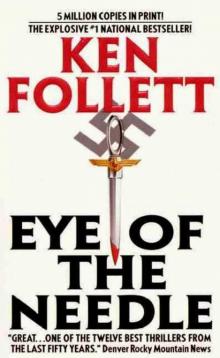 Eye Of The Needle
Eye Of The Needle Lie Down With Lions
Lie Down With Lions Winter of the World
Winter of the World Triple
Triple World Without End
World Without End Fall of Giants
Fall of Giants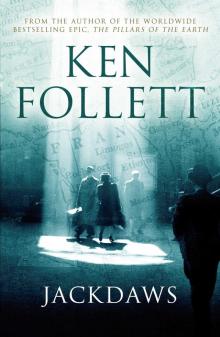 Jackdaws
Jackdaws Hornet Flight
Hornet Flight Whiteout
Whiteout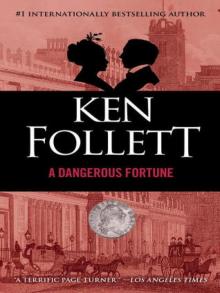 A Dangerous Fortune
A Dangerous Fortune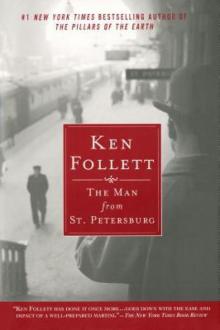 The Man From St. Petersburg
The Man From St. Petersburg A Column of Fire
A Column of Fire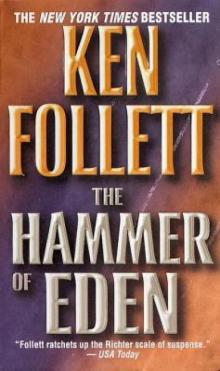 The Hammer of Eden
The Hammer of Eden On Wings of Eagles
On Wings of Eagles The Evening and the Morning
The Evening and the Morning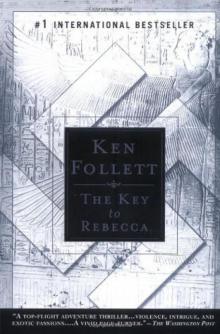 The Key to Rebecca
The Key to Rebecca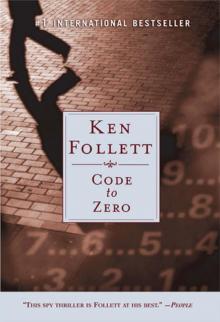 Code to Zero
Code to Zero Paper Money
Paper Money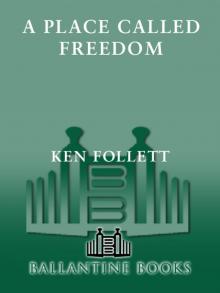 A Place Called Freedom
A Place Called Freedom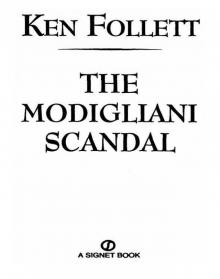 The Modigliani Scandal
The Modigliani Scandal Triple (1991)
Triple (1991)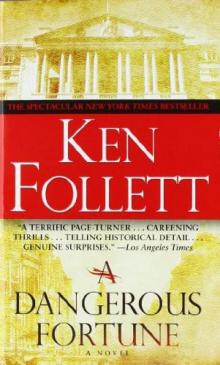 A Dangerous Fortune (1994)
A Dangerous Fortune (1994)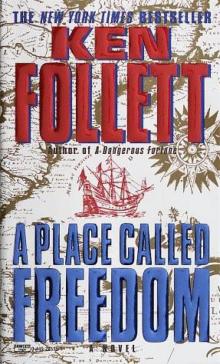 A Place Called Freedom (1995)
A Place Called Freedom (1995) Winter of the World (Century Trilogy 2)
Winter of the World (Century Trilogy 2)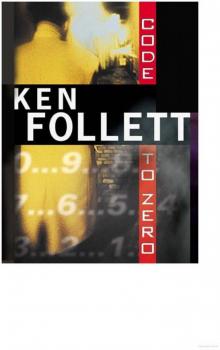 Code to Zero (2000)
Code to Zero (2000) On Wings Of Eagles (1990)
On Wings Of Eagles (1990) Storm Island
Storm Island Fall of Giants (The Century Trilogy)
Fall of Giants (The Century Trilogy)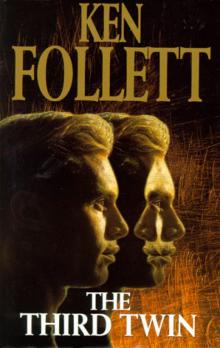 the Third Twin (1996)
the Third Twin (1996)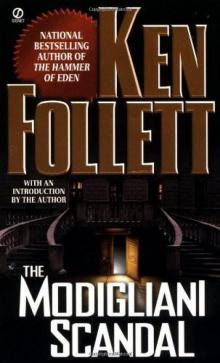 The Modigliani Scandal (1976)
The Modigliani Scandal (1976) Night Over Water
Night Over Water